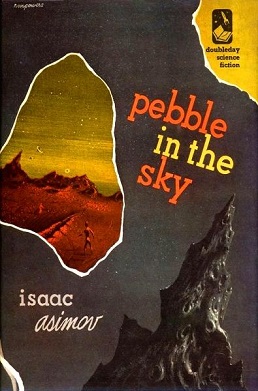
By Brown Robin: I keep reading these lists of “funny sci-fi” and it’s always the same five books. I aim to review the funny books that don’t make the lists.
So, first up:
This review is a little belated– but still timely! Under consideration is Asimov’s obscure first novel, Pebble in the Sky.
Here be spoilers!
Asimov opens with n homage to Smith’s beloved Skylark of Space. The premise is far-fetched and not much removed from Burroughs’ space travel mechanism, but once our hero Schwartz lands in the distant future, Asimov avoids shenanigans, and your suspension of disbelief will go unabused. Well, except for the mind powers….
In the future, Earth is a backwater planet disdained by the galactic comity. Some despise Terrans. For some Terrans, the feeling is mutual. A somewhat disreputable archaeologist arrives, hoping to prove his thesis that Earth is the ancestral home of all humanity.
Meanwhile, the secretive rulers of Earth, who mandate that all humans must be euthanized at 60 years old because most of the Earth’s surface is radioactive and there isn’t room for more people, are planning to drop a tailored virus on the rest of the galactic empire, which will render Earthlings as the supreme masters of all they survey.
And a physicist has developed the synapsifier, which enhances intellect, but often kills the subjects.
While on Earth, the archaeologist meets the physicist’s daughter cute, the Earth authorities jump to some conclusions about who knows what and when they knew it, and Schwartz undergoes the synapsifier.
Our heroes desperately try to save the galaxy in the face of Imperial bureaucracy, a world-wide surveillance state, and the political maneuvers of inept “players;” the bad guys keep making the wrong choices, and evincing incredible lack of self-control; and Schwartz learns how to kill people with his mind. The empire will never be the same!
I think this is an overlooked gem of a novel. It has screwball elements, and the derring-do parts are played for laughs. The final sequence when the tension is torqued to the limit of human endurance features some of the funniest dialogue in the novel, and the emotions pitched to ludicrous speed ratchet up the fun.
There are problems; it is not written for a modern sensibility. But Asimov manages to pack a lot of post-WWII political analysis and sociological insight on the nature of prejudice and entitlement that I think the novel remains germane, if not topical, all these decades later. I also think the contagion plot to be particularly on point in the post-Covid era.
This could make a swell motion picture, for those counting the Foundation receipts….
Discover more from File 770
Subscribe to get the latest posts to your email.

There was a radio-play adaptation which left Schwartz out – and since Schwartz saves the day in the book, the radio-play ends with the bad guys winning!
Loved that book. Lots of fun.
I remember enjoying Pebble in the Sky a whole lot when I first read it as a teenager.
Schwartz is one of the coincidences of the story that make it so contrived, but Asimov contrives it intentionally for laughs. Characters arrive just at the right time, the various maguffins fit perfectly into the larger plots and schemes of the various factions. It would certainly be a very different story without the retired tailor.
It’s quite fun. I’d never read it before, so it was all new to me.
It also has the longest chess game play-by-play sequence I believe I’ve read. Several pages. He describes 3D chess along the way.
I too enjoyed reading it as a teenager (almost half a century ago). Re-reading it and some of its gender politics is highly dated.
I reviewed it here
http://www.concatenation.org/frev/asimov_pebble_in_the_sky.html
Back in my teens, around the time of the Fischer–Spassky Championship, I managed to figure out all the moves of the chess game in the novel, many of which are not explicitly described but can be inferred. Some of the play is a little odd, but this is excusable given the import of the conversation the players are having while they play. The scene was one of the most atmospheric I had ever read at that time.
Well, the female lead is no Ninotchka, but it still has a bit of an Ernst Lubitsch feel. Certainly it is a boy’s-own story.
Terry Hunt, yes, the dialogue during the chess match tickled me. All that tension! Drama! Ego!